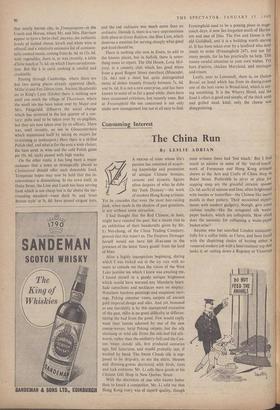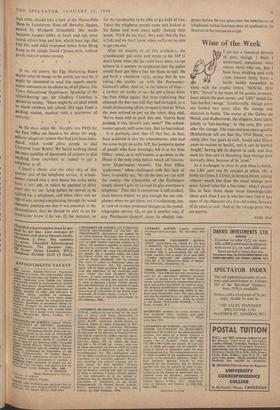Consuming Interest
The China Run
By LESLIE ADRIAN A FRIEND of mine whose life's passion has consisted of acquir- ing knowledge and possession of antique Chinese bronzes, ceramic and dynastic figures often despairs of what he dubs the 'Junk Dynasty'—the work of modern Hong Kong artisans. Yet he concedes that even the most hair-raising junk, when made in the shadow of past greatness, is not without some attraction.
I had thought that the Red Chinese,, at least, might have rejected the past; but a recent visit to an exhibition of their handicrafts given by Mr. Li Nei-thong, of the China Trading Company, proved that this wasn't so. The Empress Dowager herself would not have felt ill-at-ease in the presence of the latest 'fancy goods' from the land of Mao.
After a highly inauspicious beginning, during which I was locked out in the icy rain with no more to console me than the vision of the West Lake jasmine tea which I knew was awaiting me, I found myself in a gaudy antique brightness which would have warmed any Mandarin heart. Jade cabochons and necklaces were on display; Wenchow bamboo paintings and soapstone carv- ings, Peking cinnabar vases, carpets of ancient gold imperial design and silks. And yet, bemused as one inevitably is by this unexpected evocation of the past, there is no great difficulty in differen- tiating the bad from the good. Few, would really want their homes adorned by one of the new coarse-woven, lurid Peking carpets, but the silk shantung or wild silk (from the oak-leaf-fed silk- worm, rather than the mulberry-fed) and the Can- ton 'sweet clouds' silk, first produced centuries ago, feel luxurious, and would probably last, if washed by hand. The Sweet Clouds silk is sup- posed to be drip-dry, as are the shirts, blouses and dressing-gowns decorated with birds, trees and luck emblems. Mr. Li sells these goods at his Chinese Gift Shop in New Quebec Street.
With the discretion of one who knows better than to knock a competitor, Mr. Li told me that Hong Kong ivory was of superb quality, though most artisans there had 'lost touch.' But I find much to admire in some of the 'out-of-touch' work of Formosan and Hong Kong artisans shown at the Arts and Crafts of China shop in Baker Street. Preferable to silver or plate for supping soup are the graceful ceramic spoons (2s. 6d. each) of salmon and lime, often brightened with beetles or butterflies—the Chinese like insect motifs in their pottery. Their occasional experi- ments with modern gadgetry, though, give some curious results—like the octagonal silk waste- paper baskets, which are collapsible. How often does the necessity for collapsing a waste-paper basket arise?
Anyone who has searched London unsuccess- fully for a coffee table, as I have, and been faced with the dispiriting choice of buying either a veneered modern job with a heat-resistant top that looks it, or cutting down a Regency or Victorian
high table, should take a look at the Marco Polo Shop in Lansdowne Row off Berkeley Square, owned by Margaret Greenfield. She stocks Japanese lacquer tables in black and red, some round, others long and low, which have legs that fold flat, and solid rosewood tables from Hong Kong in the simple North Chinese style, without gaudy inlay or ornate carving.
If my old enemy the Egg Marketing Board doubts what its image in the public eye may be, it might be interested to read this superb uncon- scious comment on its efforts in, of all places, The Times Educational Supplement. Speaking of the school-leaving age, Sir Geoffrey Crowther is quoted as saying: 'There might be an ideal world in which children left school, like eggs from a Packing station, marked with a guarantee of maturity.'
* *
In the days when Mr. Marples was PRO for the Post Office we heard a lot about the mag- nificent telephone system that had just been intro- duced, which would allow people to dial Liverpool from Bristol. We heard nothing about the utter inability of thousands of citizens to dial anything from anywhere or indeed to get a telephone at all.
I heard a classic case the other day of this seamier end of the telephone service. A school- master moved into a new house ten miles away from a new job, to which he planned to drive every day by car. Long before he moved in he applied for a telephone, and when there was no sign of one, started complaining through the usual channels, pointing out that it was essential, in the circumstances, that he should be able to let his headmaster know if he was ill, for instance; or
for the headmaster to be able to get hold of him. Twice the telephone people came and looked at his house and went away sadly shaking their heads. 'We'll do our best,' they said, 'but the line is full, and we don't know when we'll ever be able to get you one.'
After six months of all this nmllarkey, the schoolmaster got cross and wrote to his MP (I don't know what else he could have done, except behave in a manner so suspicious that the police would have got him a line for them to tap). He got back a courteous reply, saying that he was taking the matter up with the Postmaster- General's office. And so, in the fulness of time— a further six weeks or so—he- got a letter from the Post Office again; this time explaining that although the line was full they had managed, as a result of unceasing effort, to squeeze him in. When the men arrived to put up the wires, they said, 'We've been told to push this one. You've been pushing it too, haven't you, mate'?' The school- master agreed, with some fury, that he had indeed.
It is perfectly clear that all that has, in fact, been achieved is that the schoolmaster, who had the sense to get on to his MP, has jumped a queue of people who have trustingly left it to the Post Office—since, as is well known, a question in the House is the only whip before which all Govern- ment Departments tremble. The Post Office 'spokesmen,' when challenged with this lack of lines, invariably say, 'We do the best we can with the money—the Chancellor of the Exchequer simply doesn't give us enough to give everyone a telephone.' That this is monstrous is self-evident, since heaven knows we pay enough for our tele- phones when we get them; but it is alarming, too, in view of certain proposed changes in the postal- telegraphic service. Or, to put it another way, if any Postmaster-General dares to abolish tele-
grams before he can guarantee the installation of telephones within fourteen days of application, he deserves to be roasted on a spit.



































 Previous page
Previous page